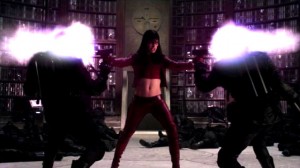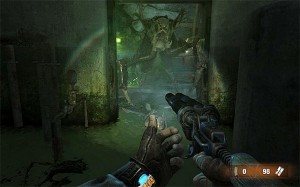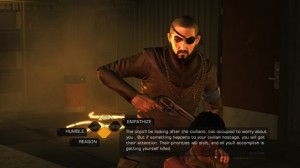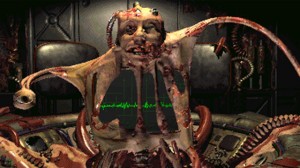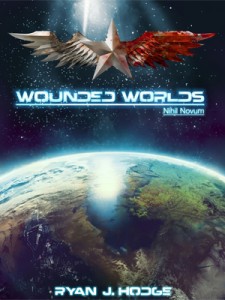-Ryan J. Hodge
For someone who enjoys a great story, is there anything better than a narrative that engages you from the very start? Imagine a world so rich you can almost smell the scents in the air, a delivery so clever it forces you to think in a way you never thought you would. I’m Ryan J. Hodge, author, and I’d like to talk to you about…Video Games.
Yes, Video Games. Those series of ‘bloops’ and blinking lights that –at least a while ago- society had seemed to convince itself had no redeeming qualities whatsoever. In this article series, I’m going to discuss how Donkey Kong, Grand Theft Auto, Call of Duty and even Candy Crush can change the way we tell stories forever.
How Unconventional Problem Solving Makes Stories More Exciting
There’s a certain habit one can get into while writing as well as playing video games; the habit of resolving problems in the most straight forward, obvious way possible. Be it with firearms or sharpened sticks, it is easy to think of conflict as an uncomplicated affair of each party dueling the other until one falls over. Unfortunately, this can lead to a bit of creative stagnation and, worse, make combat in a story outright boring.
Take Ultraviolet (2006, film) for example. In this movie, Milla Jovovich’s character, Violet, lays waste to the enemy forces with such brutal efficiency that nothing the villains send against her can really be considered a threat. Though the number of enemies is scaled up with every encounter, because Violet’s default problem solving mode is pure attack we, the audience, need not even ask ourselves How’s she going to get out of this one?
Such modus operandi is more than applicable to a lot of modern video games. The worst offenders, in fact, are some of the most popular on the market; including Halo, Call of Duty, and Battlefield. Despite their financial successes, however, there tends to be little about these titles that players find memorable. However, the moments they do find memorable tend to have little to do with endlessly felling waves of enemies.
In Call of Duty 4: Modern Warfare (Infinity Ward, 2007), perhaps the most affecting moment in the game comes during the few minutes where the action lulls and constant orders are no longer being barked into your ear. You see, a nuclear device has just been detonated and your helicopter was just at the edge of the blast radius. As the sole survivor, you do not find yourself taking pop-shots at inexplicably active enemies, or racing to a safe zone. Instead, you are allowed to wander aimlessly for a few minutes before the radioactive atmosphere claims you.
What might be most remarkable here is how the enemy has displayed his resolve in this scenario. Your opponent has realized that there is no way he can defeat the USMC through conventional means, and has thus deployed a more unconventional countermeasure. While any number of lucky shots may have killed your character more than once up to this point, those deaths are more mundane and circumstantial. Your adversaries’ victory in such a scenario doesn’t really feel earned. This death, and the totality of the enemy’s victory, is all the more significant.
This shows that not all methods of resolving conflict are created equal and the best way to grab an audience’s attention is for the hero or the villain to try something new (or, at the very least, something the audience isn’t used to).
Early levels in Half-Life 2 (Valve Software, 2004), embrace this notion as players switch between dashing unarmed from rooftop to rooftop, trading fire with enemies in cramped sewage tunnels, and culminating in dodging a relentless attack helicopter in a weaponless hovercraft. Each segment demands something different from the player, and while the game becomes a bit more homogenous later on, these rapid changes in demands encourage greater ‘on the fly’ thinking.
In fact, Valve has stated in multiple commentaries on their games that they remain mindful of player ‘combat fatigue’ throughout the design process. Their understanding is that visceral, intense combat should be punctuated by puzzles or exploration. However, they will often blend these elements by creating ‘puzzle enemies’. Rather than force the player into a static confrontation with these opponents where the outcome must be decided right then and there, puzzle enemies constantly hound the player; forcing him to exhaust his resources and act with increasing desperation.
Heroes finding themselves in desperate scenarios and improvising creative solutions are a staple of the adventure genre. The very first scene of Indiana Jones and the Temple of Doom (1984, film) has our hero skewering his first opponent with a flaming shish kebab.
The drama in such scenarios is created when the hero finds himself in a situation for which he was not prepared. 4A Games demonstrated a terrific understanding of this fact with their 2013 game, Metro: Last Light. In this title, maintenance of one’s equipment is paramount. However, the most difficult equipment to keep functioning are its firearms. As such, players will be very used to prioritizing their guns above everything else; so when they come face-to-face with bulletproof spider creatures, they will quickly have to turn to solutions they may not have expected to employ.
Instead, the player will have to rely on their flashlight to harm the photo-sensitive creatures. Keeping the flashlight charged and pointed in the right direction at all times marks a drastic change in demands from the player. While our hero could be a crack shot with a full pack of ammunition, it means nothing in the depths of those web infested tunnels as things skitter around in the dark.
However, not all unconventional resolutions must be borne from desperation. In fact, one oft-ignored item in the arsenal of problem solving is simple argument. The 2008 TV series Flashpoint focuses on Toronto’s ‘Special Response Unit’. While they are kitted with all sorts of high-end weapons and gadgets designed to kill a human being with ease; every time they are forced to use them, it is considered a failure on their part. Instead, they seek to understand what drives their dangerous suspects and talk them down into a peaceful solution.
Be it a group of common thugs or a confused teenager, there’s no question as to whether the SRU is capable of dispatching their opponents. Rather, the tension arises in the question of whether they will have to dispatch their adversaries.
While many writers may not appreciate this, seeking to avoid a firefight can be just as tense as executing one. Tarantino’s Inglorious Basterds (2009, film) features a remarkably dramatic scene wherein our heroes meet with a contact in a crowded pub in occupied France. While they are speaking in German, their accent seems strange to one of the Wehrmacht soldiers at the pub, and thus our heroes must quickly generate a lie about what region of Germany they hail from or stand revealed as infiltrators. This scene tortures the audience as the protagonists stand on the precipice of violence, knowing that a single seam in their story will mean their doom.
The narrative stakes may not reach the same heights in Eidos’ Deus Ex: Human Revolution (2011), but there are multiple dialogue bosses sprinkled throughout. These encounters, though rarer than I’d personally like them, allow the player to defuse a scenario without violence or perfidy –but only if he can get a proper read on his opponent.
Even the climax to a story can be made much more interesting through an argument, even if it’s relatively quiet when compared to the rest of the narrative. Meeting “The Master” in Interplay’s 1997 post-apocalyptic RPG, Fallout can be resolved with a simple dialogue tree; despite the brutal combat present in the rest of the game. While the player may choose to simply attack The Master in an epic brawl, if he has instead sufficiently explored the wasteland; he has the option to not only talk to The Master, but convince him that the villain’s entire plan is futile without further bloodshed at all.
The satisfaction to be found here is not in the player’s own cleverness, but the fact that he went the extra mile to learn everything about his enemy. By considering the Master, and his army to be more than some nuisance to stamp out, he stumbled upon a solution that he, and ONLY he, could arrive at. Anyone with a machine gun could have stormed the Master’s fortress, but only our hero could walk in armed with nothing but facts and walk back out again.
And so we see that being the most skilled fighter on the field still doesn’t make a character all that special, but those who are most capable of adapting to their circumstances are. So put down the gun before you pick up the pen. Who knows? It just might make you a better writer.
Ryan J. Hodge is a science fiction author and works for Konami Digital Entertainment US (His opinions are his own). His latest book, Wounded Worlds: Nihil Novum, is available now for eBook & Paperback.
You can now follow Ryan on Twitter @RJHodgeAuthor


